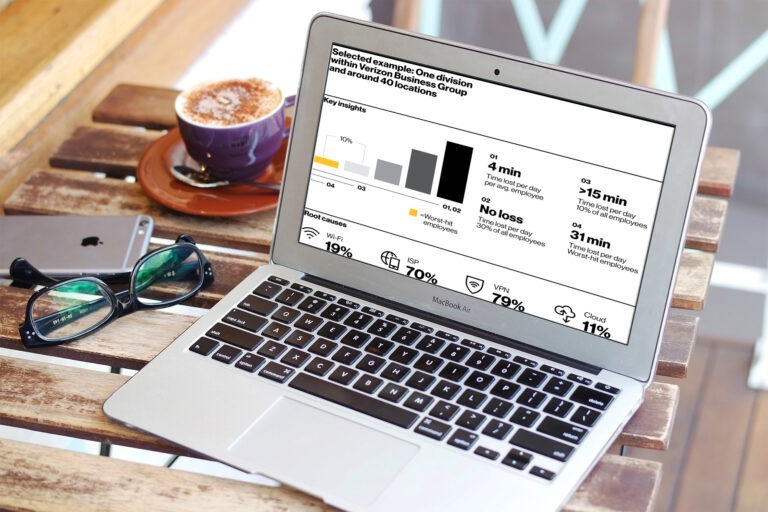Actual Experience PLC (LON:ACT) Chief Executive Officer Dave Page caught up with DirectorsTalk for an exclusive interview to discuss the background to the company, what they do, progress in commercialisation and the significance of their latest RNS.
Q1: First off, can you provide us with a little background to the company?
A1: We’re a couple of months shy of a 10 year old organisation. I’m one of the co-founders, the other co-founder is the clever guy, Professor Jonathan Pitts and it’s about a decade of his research which we are commercialising here at Actual Experience and he’s still very much a part of the company.
I guess if you think about those 10 years and how we spent those 10 years, the first 5 years was really trying to get Prof’s research working properly in the real word and the second 5 years, certainly the last 4 years have been much more about commercialisation of that research.
Q2: So, what is it that you actually do?
A2: We make the digital world work properly for everybody everywhere all the time and what we mean by that is really it doesn’t work properly all the time for everybody.
So, for instance, some people find they can watch a Netflix movie at home on their TV and it’ll be fine one day and the next day it’ll buffer and be too irritating to watch. You might be doing an online banking and one day it’ll work fine and even in the next hour it will not work fine. Those are the sorts of things we experience with consumers, we also experience these sorts of ‘working one moment, not working the next’ problems with the applications we use at work so emails, SharePoint, WebEx, most of us are familiar with these sorts of things that our businesses give us to make us productive. Sometimes they work fine, sometimes they’re a real struggle so that sot of inconsistency is the thing that we’re trying to cure and we can fix.
Business leaders now are waking up to the fact that if the applications they provide to their customers don’t work consistently, that has a very harmful effect on the brand of that organisation. Equally if those organisations don’t work consistently for their staff then they’re losing productivity.
So, those are the economic problems we solve, productivity and brand and really, we do that through algorithms which is where Professor Pitt’s research comes from. We provide analytic answers in order to solve these brand productivity issues and our business model is analytics-as-a-service.
Q3: I think you mentioned commercialisation, what kind of progress have you been making in terms of commercialisation?
A3: So, that was really the last 4 years, particularly, of half of our journey that we’ve taken so far. What we began to realise 4/4.5 years ago when we first started the selling of the service was, we fairly quickly got quite a lot of customers, it was small scale revenue, not necessarily very high quality revenue but typical of early stage revenue in that sense. There were lots of stakeholders and we found that people who were trying to cure brand and productivity in the digital world was almost all the stakeholders in the digital world, so we had small businesses all the way up to large enterprises and everything in between buying some of our analytics-as-a-service. We had managed service providers, mobile service providers, home broadband providers, cloud service providers, even regulators buying analytics-as-a-service from us in order to solve their bit of the digital world.
So, we very quickly had 70/80 customers at small scale which on the one hand, this emphasised the scale of the market opportunity. On the other hand, it presented us with a very real problem which was how do you sell to almost every business in the world because every business in the world is digital to some extent, how do you get to, how do you sell to that many businesses? Actually, we were somewhat fortunate because at the time, about 4 years ago, we had a set of organisations which have now become our partners who were evaluating our technology.
These partners are the sorts of organisations where they themselves have hundreds of thousands of customers and we started working with those and continue to work with them about building our analytics-as-a-service, our technology into their products and services so they can deliver our technology to all of their customers which, as I said, potentially could be hundreds of thousands in some of these organisations.
That became a solution for us as to how do we address such a large market opportunity, well actually these partners if we can get them to work properly become a plausible answer to getting our technology out very large scale into this market opportunity. So, really our focus over the last 4 years has been increasingly on a set of partners and in fact, we have announced four, these are Verizon, Accenture, Vodafone and there is one that’s not named in the public market, but it is a similar sort of name to the three of just mentioned.
Very recently, over the last 4 years, we’ve completed a very long cycle with these about getting these large partners into production, where they’re putting our technology inside their products and services and delivering them to their customers, clearly that starts at small scale and grows over time. They’ve had some large customers deployed at small scale for probably 1 year to 18 months and really, April and June this year we announced the first what we call full scale production deployment in two partners.
They validate a number of things for us, the very exciting one is it validates the size of the market opportunity for us because we have said when our partners deploy our technology inside their customer, inside their customers, it would generate about $500,000 per annum per customer to us. Satisfyingly, one of these deployments is currently generating about $1.5 million per annum and the other one is slightly under $500,000 per annum so very much validates the market opportunity for us.
Q4: Now, we saw an update from you last week, how significant was that RNS for Actual Experience?
A4: It’s significant but in quite a subtle way. In many ways the announcements about the full scale deployments were quite I would say, almost momentous for us after 9 or so years of journey to get there but what the last announcement does is start to bring some financial numbers out into the market for the very first time. We don’t have forecasts in the public market at the moment because our business has been emerging and at a numbers and commercial level has been emerging for some time.
Particularly, there’s a couple of numbers in this announcement, one was the amount of cash that we have on the balance sheet which is just over £10 million which, for our business like ours, is a strong balance sheet. The other number was Annualised Recurring Revenue or ARR as it’s often called, and because we’ve put the first large scale production customers into production, or at least our partners have, we have for the first time generated the first significant ARR.
We’ve announced the first number there, so we exited at the end of the last fiscal, largely to do with particularly one of these customers, at an ARR of £1.6 million annualised. One of the reasons why we’re announcing it is because we are now expecting that to grow as the acceleration of this business now takes place as this goes on, growing slowly in the first half of this year and starting to accelerate into the second half of this year.
That’s really exciting for us, it’s taken a long time to get here, to get to really the core business model and thee demonstration of it which is this Annual Recurring Revenue. We have validated the model now and we should see the ARR continue to grow and accelerate over the next few years.







































